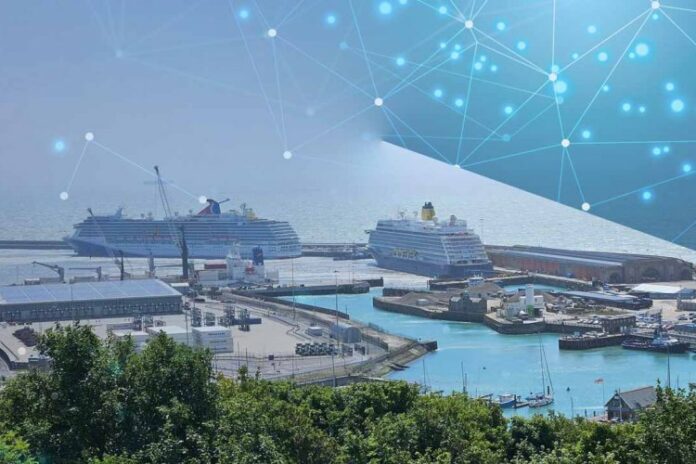The Port of Dover has formed new partnerships with four best-in-class universities to develop next-generation technological solutions for the strategic and operational challenges facing the Port of the future. The Port has committed to cutting-edge research collaboration with the Universities of Manchester, Cranfield, Liverpool, and Kent across an array of projects from port optimisation to AI, machine learning and physics-based deep learning.
These partnerships create reciprocal opportunities for the Port to benefit from each University’s world-leading researchers to resolve strategic challenges using pioneering digital solutions and enhance the journey of £144bn worth of UK trade, 11m passengers and 2.4m trucks every year, with huge dividends to be gained for UK productivity. In turn, researchers will be able to employ a unique and world-leading operational testing ground for innovation in the Port of Dover and so stretch their knowledge of potential uses of AI further than ever before.
Work with the University of Manchester is focused on the development of a digital twin for the Port of Dover, utilising machine learning and physics-based deep learning. Meanwhile, workstreams with the Universities of Cranfield, Liverpool and Kent will drive operational efficiencies in resource management, traffic flow optimisation, logistics and the supply chain through the Port and across the wider region.
Commenting, Christian Pryce, Chief Commercial Officer at the Port of Dover, said:
“The Port of Dover’s vision to become a smart, seamless, and sustainable port is fast coming to fruition, but the only way this vision can be realised is through collaboration with first-class thinkers and researchers. These four universities form the first wave of a wide range of partnerships that the Port of Dover plans to establish to help us achieve our ambitions across all areas of our operation and we encourage potential partners to reach out to us with ideas if they think they can support our journey.”
“This first set of collaborative agreements now provides a framework for engagement between the Port and four university partners – bringing projects together and acting as a springboard to remarkable digital solutions. A UKRI-sponsored feasibility study has already identified the potential of an AI-driven digital twin for the Port of Dover, which is set to revolutionise both landside and marine operations. While port optimisation projects represent opportunities for supply chain and logistics solutions to create thriving environments for commercial partners.”
“With the Universities of Manchester, Cranfield, Liverpool and Kent, the Port of Dover is set to grow its position as a world-leading Port even further, and we look forward to working with them to push their knowledge and understanding into whole new territories, driving economic growth for the United Kingdom through frictionless international trade and travel.”
Arijit De, Assistant Professor at the University of Manchester, said:
“The University of Manchester and the Port of Dover are collaborating to achieve a remarkable feat – an AI-enhanced digital twin. This advanced technology will offer marine navigation assistance that incorporates the latest port infrastructure design, to provide superior services to visiting ships. In addition, the collaboration also aims to improve passenger flow management by considering customer behavioural tendencies. These projects are geared towards improving operational efficiency and customer satisfaction within the port and have the potential to bring significant advantages to the marine industry.”
Ying Xie, Professor of Supply Chain Analytics at Cranfield University, said:
“The new partnership will help the Port of Dover move towards a digital transformation, leading to reduced energy consumption and carbon emissions. AI and data analysis will improve efficiency in operations and procedures, and this will mean quicker turnaround times and cost savings for both businesses and travellers.
The Port of Dover is also an exceptional testing environment, helping us develop knowledge in further potential applications of AI in maritime operations, logistics and supply chains.”
Dongping Song, Professor in Supply Chain Management at the University of Liverpool, said:
“We are very pleased to join the partnership with the Port of Dover to help tackle the strategic challenges that the Port is facing. We will contribute our expertise in port operations, logistics and supply chain management, optimisation, and Artificial Intelligence to help drive operational efficiencies and create environmental and social value in the Port of Dover and the wider region.”
Simon Barnes, University Strategic Partnerships Development Manager at the University of Kent, said:
“The University of Kent welcome the national collaboration that this partnership offers. Supporting the economic well-being of the UK’s deprived coast communities through innovation is a key objective of our research and innovation planning. This new academic collaboration also links to our regional partnership with universities in Lille. Ghent and Leuven.”



